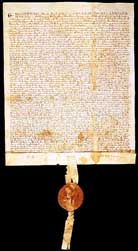
King John of England agreed, in 1215, to the demands of his barons and authorized that handwritten copies of Magna Carta be prepared on parchment, affixed with his seal, and publicly read throughout the realm. Thus he bound not only himself but his "heirs, for ever" to grant "to all freemen of our kingdom" the rights and liberties the great charter described. With Magna Carta, King John placed himself and England's future sovereigns and magistrates within the rule of law.
When Englishmen left their homeland to establish colonies in the New World, they brought with them charters guaranteeing that they and their heirs would "have and enjoy all liberties and immunities of free and natural subjects." Scant generations later, when these American colonists raised arms against their mother country, they were fighting not for new freedoms but to preserve liberties that dated to the 13th century.
When representatives of the young republic of the United States gathered to draft a constitution, they turned to the legal system they knew and admired--English common law as evolved from Magna Carta. The conceptual debt to the great charter is particularly obvious: the American Constitution is "the Supreme Law of the Land," just as the rights granted by Magna Carta were not to be arbitrarily canceled by subsequent English laws.
This heritage is most clearly apparent in our Bill of Rights. The fifth amendment guarantees
No person shall...be deprived of life, liberty, or property, without due process of law
and the sixth states
...the accused shall enjoy the right to a speedy and public trial, by an impartial jury.
Written 575 years earlier, Magna Carta declares
No freeman shall be taken, imprisoned,...or in any other way destroyed...except by the lawful judgment of his peers, or by the law of the land. To no one will we sell, to none will we deny or delay, right or justice.
In 1957 the American Bar Association acknowledged the debt American law and constitutionalism had to Magna Carta and English common law by erecting a monument at Runnymede. Yet, as close as Magna Carta and American concepts of liberty are, they remain distinct. Magna Carta is a charter of ancient liberties guaranteed by a king to his subjects; the Constitution of the United States is the establishment of a government by and for "We the People."
![]()
For
More Patriotic Titles Click Here
Copyright ©Emotions Greeting Cards a division of VH Productions 2000-2002